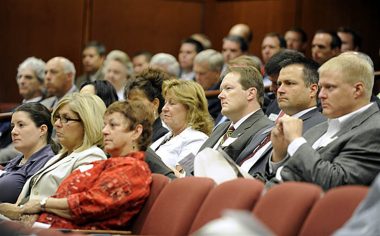Support for community nonprofits is something many people feel is a moral imperative. Kelly King, the top executive at North Carolina-based BB&T, believes corporate and individual giving makes good business sense, too. King spoke at Elon University on July 22, offering his economic outlook and explaining why support for agencies like the United Way is crucial in the current era.
The event, “Corporate & Individual Philanthropy = Community Service,” brought together more than 100 faculty, staff and community members in the LaRose Digital Theatre. King’s visit was co-sponsored by the Martha and Spencer Love School of Business, the United Way, the Alamance County Chamber of Commerce and ARAMARK.
With a welcome from Elon President Leo M. Lambert, and opening remarks and an introduction by United Way Board Chair Derek Steed and BB&T Senior Vice President Bill Gomory, respectively, King quickly turned his attention to his economic forecast.
The economy will gradually improve, he said, though it won’t be until the end of 2009 that the United States begins to see positive growth as measured by gross domestic product. Even then it won’t be like the boom times of recent years.
“We need to prepare ourselves for a slow and steady recovery, which to be honest with you, I think is appropriate,” King said. “I think it is good because this country for about 25 or 30 years has dug the hole that we’re in. Everybody wants to run around and blame somebody else. Well, my humble sense is there’s enough blame to go around everywhere in this mess.
“The fact is, the American public overspent, under-saved, under-produced, (and) over-leveraged (itself) in the last 25 or 30 years. We don’t like to admit it but we did.”
King observed how the ongoing recession is taking its toll on communities nationwide and cited the hundreds of thousands of job losses since 2008 as putting a strain on local charities that may have been stretched as they helped those already less fortunate.

When it comes to philanthropy, supporting the United Way and its affiliated agencies makes good business sense, he said. A region’s economic health is tied to its social health, and support for community partners – whether financial or through gifts of time – is critical.
“From a pure corporate perspective at BB&T, we know it is really good to support various community organizations that are helping the community be a better place because if we did not, our community would not grow, it would not prosper, in fact we would decay,” he said. “Our employees would not prosper, would not enjoy living in the community, and we would have difficulty recruiting people to come and work in our community.”
King also emphasized that business practices aside, his support for local charities and the United Way is personal. His talk reflected on his upbringing on a North Carolina tobacco farm and the opportunities he had to advance himself due to the generosity of others.
“I’ve been blessed,” King said, “and it’s very important for me and my family to give back and help those in need.”
The Wednesday program marked the second time in less than a year that BB&T’s top executive visited the university. In November, outgoing CEO John Allison served as the 2008 Ethics in Business speaker for the Martha and Spencer Love School of Business.
BB&T is the 10th largest financial services holding company headquartered in the United States. King joined BB&T’s Management Development Program in 1972 and has served in several roles with the company. He was named a director of the Federal Reserve Bank of Richmond in January.
King earned his undergraduate degree in business accounting and a master’s degree in business administration from East Carolina University. He also attended the Stonier Graduate School of Banking at Rutgers University.



